Peter MALONE
Saturday, 18 September 2021 19:33
Great Imposter, The
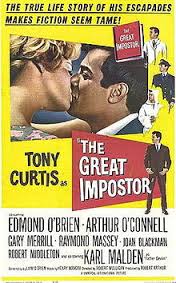
THE GREAT IMPOSTER
US, 1960, Black and White.
Tony Curtis, Karl Malden, Edmond O'Brien, Arthur O'Connell, Gary Merrill, Raymond Massey.
Directed by Robert Mulligan.
The Great Imposter is a very entertaining and seemingly improbable film. Tony Curtis at his best portrays the practical joker and hoaxer Demara. Curtis receives very good support from Karl Malden, Edmond O'Brien and Raymond Massey amongst others. Demara was an expert at impersonating various styles of personality and getting away with it. His expertise and knowledge and humanity in the roles that he undertook was quite remarkable. The film portrays his story as well as asking the audience to puzzle over what they think of such a person. Directed by Robert Mulligan, who is noted for his humane touch for his comedies and dramas. Curtis had worked for him in The Rat Race in 1960. Other Mulligan films include Inside Daisy Clover, Love with the Proper Stranger, Up the Down Staircase, The Stalking Moon.
1. Did you like this film? Why? Was Demara a great imposter. or just a funny imposter, or an unfunny con-man? Why?
2. What was the film's attitude towards Demara's activities? How much did the film admire them, puzzle over them, satirise theme make us share his fantasies? Was the film consistent in its attitudes towards him? The very final sequence?
3. The contribution of the black and white photography the light music and the them, the episodic nature of the film, the flashback technique, the uncertainty of the ending?
4. How much was the film geared to Tony Curtis's style and charm? How much sympathy did the audience have for him? Did he sustain interest in his character and portray him consistently? Could the audience understand how a con-man like this worked? What the style of personality was? The why and the how of what he did?
5. what did the sequences of Demara as a boy contribute to our understanding? To entertainment? His school experiences the sweets for the boys getting injections?
6. His relationship to his parents - especially his father? Did this explain why he acted as he did? His relationship to Father Dev1in? Did this explain why? The importance of Father Dev1in's little sermons? The clues here e.g. Father Dev1in's wish to be a Trappist and its lack of fulfilment and the influence on Demara?
7. How enjoyable were the episodes in themselves - humoured pathos, the work of a hero, the sentiment involved, their plausibility?
8. What did all the episodes add up to? Trying to be an academic and enter the army, the skill in faking the documents and the suicide? The contribution of being a Trappist and the religious overtones of Demara's life? The experience in prison and with the prisoners? His ambitions in becoming a warder and the importance of his success? Demara's falling in love and the truth that he was unable to tell his girlfriend? The humour of the Captain and the dentistry? The more serious operations and his heroism? The way that he engineered his escape? His becoming a teacher?
9. How much self-interest was there in Demara’s activity? How much a searching for identity? Did he understand himself or his identity at all? How real was his attitude towards himself? How unreal? The fact that there was so much service and giving in his escapades? The fact that he was not a hard man but a good man? How is it possible for a human being to live so many facets of others' existence?
10. What is the value of a film like this? Does it help us understand people? How cheerful is it? How sad?
Published in Movie Reviews
Published in
Movie Reviews
Tagged under
Saturday, 18 September 2021 19:33
Great Expectations/ 1975
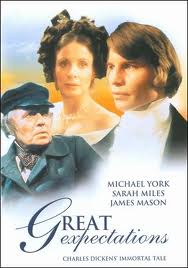
GREAT EXPECTATIONS
UK, 1975, 124 Minutes, Colour.
Michael York, Sarah Miles, James Mason, Margaret Leighton, Robert Morley, Anthony Quayle, Rachel Roberts, Heather Sears, Andrew Ray.
Directed by Joseph Hardy.
Films of classics invite comparisons with originals. This one is closer to the novel than to David Lean's 40s version, but it does not match the earlier film. It has a TV special air: sets, colour and staging are not so good. However, the ensemble of actors contributes to its value. Michael York is a sturdy Pip, Sarah Miles, especially in her younger sequences, a nicely tantalising Estella. Anthony Quayle stands out as Jaggers, but James Mason is a very subdued Magwitch. Margaret Leighton is good as Miss Havisham, but she lacks mysterious venom, her house lacks atmosphere. But it is enjoyable - or one gets used to it!
1. Audience expectation because of the interest in Dickens, his reputation: his type of characters, strong plots, events and coincidences, his presentation 19th century London? Dicken's literary reputation?
2. Comment on this film in the light of the previous versions, a version of the 30s, the classic status of the film of the 40s? How well did this version stand? For what purpose was it made? A more popular audience and hence popular treatment?
3. This version was prepared as a musical with the songs eliminated. Is this evident, to what effect?
4. The importance of so many stars playing so many roles? Their effectiveness, and a distraction or a-contribution? The importance of Sarah Miles playing Estella all the way through? How convincing was she, especially when young? Use of colour, sets and locations, musical background?
5. This screenplay remained close to the plot. Did it echo and capture the essence of the novel? Plot and characters, issues, atmosphere? Did it have the sinister atmosphere? Did it highlight the significance of the title with its themes?
6. How well did the film focus on Pip? What kind of boy, his character, experience and environment? His life on the moors, at home with Joe and Mrs. Joe? The surprise at the encounter with Magwitch? The way that he gave him the food? His helplessness at Magwitch's arrest? His reassurance? How did this incident affect and influence his whole life?
7. The contrast of the invitation to play with Estella? The effect of her teasing of him, his infatuation, the future, the final growth in to love?
8. The atmosphere of the early part of the film and the contribution of characters like Mr. Pumblechook, Joe and his sympathy, Mrs. Joe and her severity, Bridget and her sympathy? A gallery of Dicken's characters?
9. The impact of Mr. Jaggers, this 19th century lawyer, his attitude towards justice and administration, his attitude toward Pip and service of him? The ambiguity he offered about the great expectations? Pip and his misunderstanding?
10. How convincing was Pip as a blacksmith? The possibilities for his future life? The transition to a man-about-town the influence and tuition of Herbert Pocket, the encounter with Drummle? Pip becoming a snob because of his great expectations? How was this highlighted in the embarrassment of ice's visit contrasting with the social occasions in which Pip was involved?
11. The revelation of the origin of the great expectations and the irony? The effect on Pip? His awareness of Estella in this light? The irony that she was Magwitchs' daughter?
12. How convincing a character with Magwitch? His devotion to Pip over the years, his return to England to see him, his dependence? Pip's mellowing and responding to him?
13. How suspenseful was the organisation of the escape? The sequence in the river? The importance of Magwitch dying in prison, the locket and Pip's explanation that his daughter was alive before his death?
14. The reasons for Pip's disillusionment, his going to India, the motivation for his return? The final encounter with Estella? The possibilities for the future? Estella becoming Miss Havisham?
15. How much attention did the film give to plot details, sketching the character gallery, showing the people and issues as very much part of the 19th century? What were Dickens' main issues in the film? Comment on the use of coincidences and fate. How interesting a film, how enjoyable?
Published in Movie Reviews
Published in
Movie Reviews
Tagged under
Saturday, 18 September 2021 19:33
Great Expectations
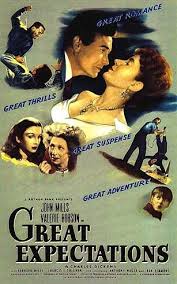
GREAT EXPECTATIONS
UK, 19646, 118 Minutes, Black and White.
John Mills, Valerie Hobson, Finlay Currie, Alec Guinness, Martita Hunt, Jean Simmons, Anthony Wager, Bernard Miles, Francis L. Sullivan.
Directed by David Lean.
Great Expectations is a British classic. Director David Lean who had made such impressive films during the war as in Which We Serve and This Happy Breed (in collaboration with Noel Coward) collaborated also with Coward after the war with Blithe Spirit and Brief Encounter. He then made his versions of Dickens' Great Expectations and Oliver Twist. Lean, a careful craftsman, has made very few films comparatively. In the 50s he made Breaking the Sound Barrier, Hobsons Choice, Summertime. Since then he has made The Bridge on the River Kwai, Lawrence of Arabia, Dr. Zhivago, Ryan's Daughter. He has provided great entertainment for a vast audience.
His adaptation of Great Expectations is perhaps not so close to the original at times but certainly has the atmosphere of Dickens. John Mills was very good in the lead. Valerie Hobson was popular at the time and an effective Estella. The film also had an early performance by Jean Simmons and introduced Alec Guinness to films. Guinness was then to be Fagin in Oliver Twist and appear in many of Lean's films. Finlay Currie was very good as Magwitch and provides a famous startling scene in the cemetery at the beginning of the film. Martita Hunt was Miss Havisham. The black and white photography, the creation of atmosphere and the Dickens' themes are very much to the fore and are enjoyable and repay reflection. There was a musical remake in the 70s with Michael York and Sarah Miles and James Mason in the leads. It was entertaining but did not compare to this original.
1. This film is considered a classic. Why? How well written, acted, how well filmed was it? Did it do justice to Dickens' work, to Dickens' world? How? How enjoyable was the film? How impressive?
2. The significance of the title and its relationship to Pip: the atmosphere of wealth and snobbery? The emphasis on 'class' and its effects on people? What did the great expectations do to Pip?
3. How successful was the narrative technique of the film? Pip's narrative of himself? Our sympathy with Pip? His moralising comments on his own behaviour? What effect did this have?
4. How well did the film establish the setting? The quality of the black and white photography? The atmosphere of the 19th century and 19th century manners? The initial impact of the marsh? of the home and the Gargerys? Miss Havisham's mansion? The recreation of 19th century London?
5. Dickens relies very much on coincidences. How was this evident in the film? were the coincidences too coincidental? Or were they handled well in the film? what point was Dicken's making by showing how much coincidence there was in the events of life?
6. The cemetery scene is famous. The convict's frightening of Pip. How important was this in itself? Pip's visiting the cemetery, establishing his orphan status, his devotion and his fear, his reaction to the convict, his kindness and the repercussions that this had, his seeing of the other convict? How central was this initial sequence in the cemetery?
7. The importance of Joe and Mrs. Joe for establishing atmosphere? Mrs. Joe and the 19th century manner? Her severity with Pip? Making him afraid, especially as regards honesty and the convict? The kindliness of Joe? Was it weakness? Was it good nature?
8. The arbitrary behaviour of Miss Havisham? What was your response to Miss Havisham? Her cruelty in using Pip for Estella? The whole background of Miss Havisham's story? Was this credible? Comment on the success of her make-up and the decor of her decaying house? The impact of this for the film? How did miss Havisham change towards Pip throughout the film? What were your first impressions of Estella? Was she likeable? Was it credible that she had such an effect on Pip? Her treatment of him? The importance of the fight with Herbert Pocket? Humour? The reaction of Estella? What did this experience at Miss Havisham's do to Pip, especially as regards snobbery and expectations?
9. Did you think that miss Havisham had given him the money? Why? How did the expectations change Pip's outlook? His changing for Estella? The effect that money had on him?
10. How was the change in Pip evident in London? The importance of the journey sequence, the map and the hooves? His meeting with Mr. Jaggers, Wemmick, Herbert Pocket? His vanity in himself, setting up house, dancing lessons, the 'at-home'? What result did the expectations have on him?
11. What was your impression of Mr. Jaggers? A good lawyer? His behaviour and attitudes towards people? His legalism and impersonal touch? In contrast to Wemmick's house with the aged parent? The humour and kindness towards the aged parent?
12. How did Pip respond to the grown Estella? Her explanation of herself, her upbringing, her coolness? Miss Havisham's satisfaction at making Pip unhappy? The importance of the visit of Joe in this regard? The awkwardness of Joe and his being out of place? Pip's snobbish reactions? His later sham-- for this? The importance for Joe's ultimate kindness?
13. Were you surprised that Magwitch was the benefactor? The impression that Magwitch made when he arrived at Pip's rooms? The impact on Pip? How did the film show this affecting him? How did it eventually improve Pip and make him sense true values? His defiance then of Miss Havisham? The irony of Miss Havisham's death and its horror? What impact did this have in the film?
14. How did the tone of the film change with the organizing of the escape? Jaggers' story and the full truth? Pocket's collaboration? Pip's self-sacrifice in organizing the escape? How exciting was the escape itself? How melodramatic the crash with the boat? Magwitch's arrest and his death?
15. How important was loyalty at the end of the film? Pip's loyalty to Magwitch and Estella?
16. Joe's final loyalty? How impressive was Joe as a character? Poverty, simplicity, no great expectations?
17. Was Pip right to challenge Estella? What result did this have in opening her eyes to the world? In not being another Miss Havisham? What future did they have?
18. How valuable a picture of 19th century England was this? What values did the film explore? What was its main moral message?
Published in Movie Reviews
Published in
Movie Reviews
Tagged under
Saturday, 18 September 2021 19:33
Greatest Story Ever Told, The
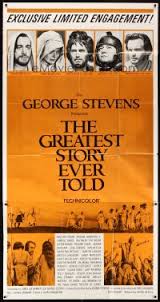
THE GREATEST STORY EVER TOLD
US, 1965, 225 minutes, Colour.
Max von Sydow, Dorothy Mc Guire, Robert Loggia, Charlton Heston, Michael Anderson, Robert Blake, David Mc Callum, Roddy Mc Dowell, Ina Balin, Janet Margolin, Sidney Poitier, Telly Savalas, Angela Lansbury, Martin Landau, Joseph Schildkraut, Jose Ferrer, Claude Rains, Donald Pleasence, Richard Conte.
Directed by George Stevens.
The Greatest Story Ever Told was the last of the great New Testament blockbusters until Zeffirelli Jesus of Nazareth. It came out in the mid-sixties after such films as the King of Kings and Barabbas. Directed by George Stevens who had made fine films from the 30s, including A Place in the Sun and Giant for which he won Oscars. The Greatest Story Ever Told seemed to be very heavy. Filmed in Cinerama, with many guest stars, including John Wayne as the centurion at the Crucifixion, the film was in many ways distracting as people tried to spot the stars. Max Von Sydow was imported from Sweden and with his reputation for convincing acting in Ingmar Bergman's films, but makes the person of Christ seem over-serious and over-solemn. There is a rather fundamentalist approach in the interpretation of the Gospel stories. However, there is some use of imaginative symbolism in the devil played by Donald Pleasence who appears in the desert and at the Crucifixion. Perhaps the film could be described as ponderous and over-reverent. However, films like this are valuable in so far as they help us visualise the background of the Gospels and Jesus' life.
1. The impact of the title and its fulfilment in the film: the story of Jesus, the religious insight, the reverence in the treatment of the story? A valuable religious experience? Why, or why not?
2. Technique: panavision, of colour, classical music, Israeli landscapes? What did this add to the atmosphere of the film?
3. How solemn was the film? Was solemnity appropriate? How serious was the treatment? What response do audiences give to such solemnity?
4. Comment on the structure of the film: the use of quotations from the New Testament, the large number of quotations from the Old? The infancy narratives, the role of John the Baptist, Jesus' public life, the large amount of the film given to the Passion?
5. Was the film realistic? Should it have been realistic? Response to seeing Gospel incidents enacted so realistically? Where was the realism most successful? Where was it out of place? Consider the infancy narratives, the miracles, the crucifixion? Should the film have been more symbolic than realistic? Where was the film best symbolic? The use of the pilgrim as the evil figure for the temptations etc.?
6. How interestingly did the film fill out the world background to Jesus' life? The portrayal of the Herods, the Romans and their occupation, Pilate and his role in Judea, the influence of each of these factors on Jesus' life?
7. How successful was Max von Sydow's portrayal of Jesus? His style, personality? Was he a credible God-Man? figure? How attractive was he? The main qualities of Jesus as a person?
8. The portrayal of Jesus' infancy: was it too realistic, was it credible, birth, the Magi, the killing of the infants, the sequences in Egypt?
9. The importance of John the Baptist in the film? Charlton Heston's style? The Old Testament quotations, the preparation for Jesus, the Baptist's encounter with him at the Jordan, the importance of John's imprisonment, his death?
10. What were the film's main emphases on Jesus' personality and preaching? The use of the Sermon on the Mount, the preaching on wealth and poverty, the choosing of the disciples, the miracles, friendship with Martha and Mary, the raising of Lazarus etc.?
11. How important was the portrayal of Herod, his questioning of the Magi, his persecution of the children, the influence on his son? Herod Antipas and his relationship with the Baptist, Herodias and Salome, the sequence during the passion when he mocks Jesus?
12. How imaginative was the portrayal of Jesus' temptations? The pilgrim and his questioning of Jesus, his re-appearing during miracles and the casting out of devils, at the passion and his call to crucify Jesus? The evil characterised by him?
13. How important was the Last Supper? The role of each Apostle, of Judas, the background of Judas during the film, the money and Mary's anointing, his betrayal to the High Priests, the significance of his death (not hanging)?
14. Agony in the Garden: insight into Jesus' trouble and suffering?
15. How convincing was the passion and suffering of Jesus? The questioning of the High Priests (and the background preparation for this in insight into their characters?) : Pilate and his trying to be fair, his wife's dream, his absolving himself?
16. The impact of the carrying of the cross, the help by Simon (was Sidney Poitier too obtrusive in this role? the black man helping the white man the civil rights overtones) : Veronica and the various people on the way?
17. The visualising of the crucifixion - was the thunder and lightning overdone, the place of Mary, the conversation between the thieves, the centurion's call (and John Wayne's saying of this).
18. Was the Resurrection well handled? Did it seem real? Did it seem a dramatic anti-climax? Or the culmination of the film?
19. The achievement in this religious film? Was it as successful as other films of the life of Christ?
Published in Movie Reviews
Published in
Movie Reviews
Tagged under
Saturday, 18 September 2021 19:33
Greatest Show on Earth, The
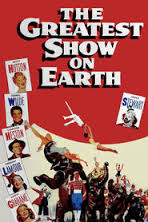
THE GREATEST SHOW ON EARTH
US, 1952, 153 minutes, Colour.
Betty Hutton, Cornel Wilde, Charlton Heston, James Stewart, Gloria Grahame, Dorothy Lamour, Lyle Bettger.
Directed by Cecil B. De Mille.
The Greatest Show on Earth won the Oscar as the Best Film of 1952. Most consider it did not deserve this award. It was meant to be a tribute to its producer and director, Cecil B. De Mille. It was to be De Mille's second last film. De Mille had had an extraordinary career in Hollywood from the early 20s. He made his name with biblical spectaculars such as The King of Kings and The Ten Commandments. In the 30s he turned to history - the Roman Empire with Cleopatra and The Sign of the Cross and American history with The Plainsman, Western Union, North West Mounted Police etc. In the 40s he had the West in Unconquered and the Bible in Samson and Delilah. He then turned his attention to the circus and produced a most entertaining light circus film. Gathering together many popular stars of the time, he cast Charlton Heston in one of his early major lead roles. (Heston was then to be his 'Moses' in The Ten Commandments.) Another unusual piece of casting was James Stewart disguised as a clown because he was a doctor afraid of being arrested for mercy killing. There are plenty of colourful circus scenes, a most spectacular train crash, and melodramatics and romance. The film certainly shows the showmanship of Cecil B. De Mille.
1. The tone and emphasis of the title, a Cecil B. De Mille film, Cecil B. De Mille presents the circus. Expectations of a De Mille spectacular? How well were they fulfilled? De Mille's own narrative about the life and effect of the circus? Its tone, his emphases? The special effects of the film, the circus acts, the train crash? Did it merit an Oscar for the best film of the year?
2. The overall success of the film in terms of entertainment, for the widest possible audience? Why? Colour, spectacle, music, the songs?
3. The De Mille approach to circuses: the world of the Big Top, the range of acts presented during the film and their stylish presentation, the emphasis on spectacle and variety? Why do audiences enjoy such acts? De Mille showing the audience responding in the film? which particular acts were most striking, why? The emphasis on freaks, clowns, skilful acts, daring, danger? Why the appeal of each?
4. De Mille's emphasis on life behind the circus? The world of money and finance, deals, crooked deals, criminals, plans for take-overs, plans for the season, contracts and negotiations, the harshness of the sawdust in people's veins and the subjugation of human feelings? De Mille's presentation of all this world, attitude towards it? Audience interest in the back scenes?
5. The presentation of management, the executives, the family traditions of the American circuses, winter quarters, the practical manager, the various practical details, the sequences of putting up the tents and the emphasis on co-ordination, transport arrangements, trains, arrivals in towns, advertising? How well were all these things visualised?
6. The portrayal of characters within this framework of the big circus? The effect of understanding the characters via the circus and their involvement in the circus? The good and bad qualities of each character, fame, success, loyalty to the circus?
7. The melodramatics of the opening situation, Brad and his manoeuvres to get a whole season for the circus? The contract with the Great Sebastian? The necessity of Holly's not going in the centre ring? Human clashes? The build-up of tension as it continued throughout the film?
8. The character of Brad? An early Charlton Heston characterisation? The tough and practical manager, his skill in overseeing everything? His practical dealings with everybody from workers to performers? Their loyalty to him? How much was sawdust in his veins? His subjugation of human feelings? His managing people, even Holly? His harshness towards her? His welcome of Sebastian and buying him off the police fine? His decision about nets? His clashes with criminals? Friendship with Buttons? The various arrangements? The girls attracted to him, Holly's infatuation and love as well as her hostility? Angel and her wanting to keep house? His priorities? The effect of his injury on the train? The circus and his life and his change of perspective at the end and the irony of Holly wanting the show to go on? A rounded character?
9. Betty Hutton and the liveliness of Holly? A character, a type? Her role and life in the circus, building up her act, her ambitions and zest? Her devotion to Brad? Her being in everything and in so many acts? Trapeze, singing? The rivalry with Sebastian and the initial encounter? The rivalry between the two and the dramatics of the various acrobatic and aerial acts? The stupidity of the rivalry and her reaction to Sebastian's being hurt? Pity and love? The crash and her realisation of love for Brad? Her energy in the show going on? An appropriate heroine for this kind of film?
10. The contrast of Sebastian with his flamboyance, his arrival? His way with women, the various lines that he took, the romantic French lines? His response to the rivalry with Holly? The skill of his acts? His politeness and kindness in allowing Holly her way? The wisdom of his taking the risk and his being hurt? His pride in walking out of the ring? His cheerfulness and yet his dead hand? His selling things and his yearning for the high wire? His hand moving and Brad's challenging him? The possibility of his recovery?
11. Angel, the girl who has been around? Her worldly wisdom, attitude to Sebastian, to Phyllis, to Holly, to Brad? Her pleasantness, hard-working. involvement in her acts? In so many of the acts; the sequence of her conversation with Holly in the carriage? Interfering? Curt's jealousy and the risk of the elephant's foot on her face? Her decision at the end and co-operation?
12. Phyllis and the providing of comedy by a dumb, humorous type? Dorothy Lamour's reputation and style? The humour of Bing Crosby and Bob Hope in the audience?
13. Curt and his jealousy, his intensity, his fights? His league with the criminal? The build-up to his being sacked after his attempt on Angel's face? His decision to rob the train? After the robbery and his reaction to Angel's possible death in the crash, his warning them in the car?
14. The character of Buttons and James Stewart's style, the irony of his always being in makeup? The mystery, his mother, his being a doctor, the gradual revelation of the truth, killing the person one loves? The police, the fingerprints, the crash, his decision to help Brad.
15. The spectacle of the smash and the way it was filmed, the consequences for the circus, Holly, the parade, the final performance?
16. Audience response to the blend of spectacle, entertainment, joy, an optimistic view of human nature?
Published in Movie Reviews
Published in
Movie Reviews
Tagged under
Saturday, 18 September 2021 19:33
Great American Beauty Contest, The
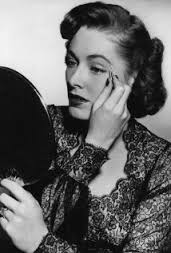
THE GREAT AMERICAN BEAUTY CONTEST
US, 1972, 73 minutes, Colour.
Eleanor Parker, Bob Cummings, Louis Jourdan, Farrah Fawcett, Tracy Reed.
Directed by Robert Day.
The Great American Beauty Contest is an interesting and enjoyable melodrama, much better than the title might indicate. It was written by Stanford Whitmore, writer of such films as The Summer of My German Soldier. The film portrays the background of the beauty contest and the possibility of rigging. It also shows a cross section of the contestants and is able to introduce such themes as racism and feminism. Eleanor Parker gives a very strong performance as the co-ordinator of the contest and Robert Cummings personifies the bland compere. Louis Jourdan is the suave villain. The film runs along somewhat expected lines but is interesting and enjoyable nonetheless. It was one of Farrah Fawcett's earliest roles.
1. The appeal of the subject, presentation? The popularity and place of such contests? The emphasis on beauty? The media, competitiveness? The focus on the candidates and the type of girl who enters such a competition? The human interest of the people involved? The possibility of corruption and rigging? The glamour of winning? (Feminist themes and Women's Liberation.)
2. An entertaining telemovie, for the how audience used to watching such competitions? Brevity, the theme of the competition, character interaction?
3. Los Angeles and the world of glamour, hotels, the media, the various items in the contest, the final pageant? The ballyhoo of the press and the atmosphere of such competitions?
4. Peggy and Corton and the running of the competition, their pride in its traditions, the emphasis on integrity, press conferences and press releases, the possibilities of something going wrong? The introduction to Peggy and Corton and the setting of the scene?
5. Eleanor Parker's style as Peggy - her past success, the tradition of the contest, her statement of high ideals, her ability to cope with people and situations? The press, the opening dinner and her speech? The quality of her advice to the various candidates? Her relationship with Dupree and the past? His blackmailing her? The choice of Angelique and Peggy's giving her the key? The importance of her changing her mind, the stance that she took, telling the truth to Corton, his handling the press? The defeat of Dupree and her realisation she could have won the competition without him? Her handling of the other girls especially T.J. and the story of her marriage? Her final enjoyment of the competition? A rounded portrait of a film star working in this role?
6. Corton and his style, the nice guy image, his integrity, his awareness of problems, Peggy's confidence in him, the confrontation with Dupree, his M.C-Ing the final part of the contest and his good humour, platitudes, the expected statements?
7. Dupree and his film background, the suave manner, his expectations of himself and using people, his choice of Angelique, the hotel room sequence, the clash with Peggy and his defeat?
8. The background of the competition - training in movement, beauty, acting and singing, poise, the final pageant and the statements on happiness? The work of the chaperones?
9. The pros and cons of such a contest - artificiality and glamour, the feminist objections and campaign, the hopes, the chances for career, scholarship? The ideals of American beauty?
10. The cross-section of girls presented:
- Miss Idaho and her being away from home for the first time - her prayer at the end for happiness?
- Miss New Jersey, the black girl, race statements, Peggy's discussion and persuasion of her to stay in the competition for race reasons. Her statement on happiness?
- Miss Texas and Farrah Fawcett and her glamour, style, giggly attitudes, her boyfriend, hiding him in the room, his press conference and her denial, her performance of the Sheikh of Araby, her joke about happiness?
- Miss Maine - and her seriousness, the telegram from her father and the phone calls, her decision to go to Dupree's room, her saying that she wanted to model herself on Peggy, her statement on happiness?
- Miss Oklahoma and the plan for upsetting the competition, her friends in the Liberation Movement, her poise and glamour, her being confided in by Peggy - did Peggy really know and understand her? Her statement on happiness? Her winning and her being overcome?
11. The dramatic significance of Miss Oklahoma winning, being overwhelmed and succumbing to the atmosphere of the competition? The hostility of her friends at the betrayal?
12. Popular entertainment and presenting issues to a wide popular audience?
Published in Movie Reviews
Published in
Movie Reviews
Tagged under
Saturday, 18 September 2021 19:33
Grease 2
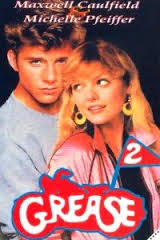
GREASE 2
US, 1982, 109 minutes, Colour.
Michelle Pfeiffer, Maxwell Caulfield, Didi Conn, Eve Arden, Sid Caesar, Lorna Luft, Adrian Zmed, Christopher McDonald?.
Directed by Patricia Birch.
Grease 2 is principally a reworking of the original. Robert Stigwood and Alan Kerr produce again. The original choreographer Patricia Birch acts as both choreographer and director. With Olivia Newton- John and John Travolta absent, the film lacks a great deal of verve. English actor Maxwell Caulfield is somewhat understated in the central role. Michelle Pfeiffer, who has a comic style, is somewhat abrasive as the leading lady. Once again there are the T-birds who sing, dance, leer and pretend to act tough, and the Pink Ladies who are the 'in' group of girls. Lorna Luft, Judy Garland's daughter, is particularly striking as the outspoken Paulette. Maureen Teffey, who was such a success in the leading role in Fame, does not have to do so much here. Didi Conn, who was Frenchie in the original, has a guest appearance. others from the original are Eve Arden as Miss Mc Gee and Dody Goodman as Blanche, her assistant. They provide some comic touches, as does Sid Caesar as the coach. For good measure this time, Tab Hunter and Connie Stevens are presented as two of the teachers. They also get the chance to sing - especially Tab Hunter in an offbeat suggestive classroom song called 'Reproduction'.
The songs and the choreography are lively but not particularly memorable - especially in comparison with the original. The film traces the life of the school for 1961 and echoes some of the styles of the time. Instead of a dance competition there is an amateur performance competition, which is won by the leads. There is also the outsider, this time the English student, who is gradually accepted into the school. An excellent student, he does a lot of the assignments for the fellow students but fails to win the heart of the heroine. However, he fixes up a bike, dons leather and is an unknown 'easy rider' striking terror into the group that attacks the T-birds. With some excellent stunt work, he makes an impression on the heroine and eventually reveals himself at the end. The romance is at a very basic level. There are some very comic touches, some crudities, some adolescent humour. There is the usual battle of the sexes and the usual poking fun at education - although at the end it has its moment of seriousness (a bit more serious than the end of the original). Grease 2 is not particularly memorable but is musical entertainment, of the TV special variety, for adolescent audiences of the early '80s.
Published in Movie Reviews
Published in
Movie Reviews
Tagged under
Saturday, 18 September 2021 19:33
Grasshopper, The
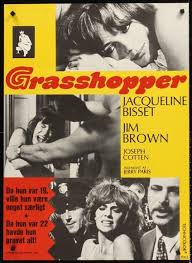
THE GRASSHOPPER
US, 1970, 92 minutes, Colour.
Jacqueline Bissett, Jim Brown, Joseph Cotten.
Directed by Jerry Paris.
The Grasshopper has been billed as an intelligent drama, full of human sympathy and understanding. It was supposed to be to 1971 what Midnight Cowboy was to 1970. This claim is certainly open to debate. While the film traces the experiences of a nineteen year old girl leaving home in Canada and hitchhiking to California (there is definitely a parallel to Joe Buck's leaving the south and riding to his visionary city of New York), it dwells on the sordid side of these experiences for their own sake. This was something Midnight Cowboy rarely did. Here we are treated to life in Las Vegas for far too long and for too little significance.
Similar comments could be made on the rest of the film. One wonders how much insight we have gained into the central character who finishes her course at 22 years in gaol after going on a skywriting spree writing a four letter word over Los Angeles.
The acting is quite good, but part of the fault of the film (besides the limited vision behind its conception) is a derivative style - there seem to be echoes of many of the popular films of the late 60's, even to one inexplicable insertion of some sepia-and-white frames reminiscent of A Man and A Woman. The film certainly shows us a slice of American life as it is today, and like these slices of life, it doesn't get very far and does not arrive.
1. Was this a significant drama?
2. Did it explore values and present a person who, although confused, engaged audience attention? What was the main theme of the film?
3. How did the opening of the film - leaving home, the cat, hitchhiking etc, indicate a theme of searching?
4. How innocent was the heroine, how naive?
5. What impression of American society did the film give - e.g., the people at the Las Vegas party?
6. Did the heroine have any alternatives than becoming involved with the Las Vegas chorus, the pop group, deviates, pornography, drugs, and the call-girl life?
7. Did the film present this sordid (and real) background in a restrained way or were the sensations exploited?
8. Was there any social significance in the heroine's romance with a negro sports her?
9. Comment on the Las Vegas 'Loved one' wedding as satire on US society.
10. Why was the dinner and the attempted rape by the tycoon included? What was the significance of the heroine spitting in the secretary's face?
11. The golf club bashing?
12. Was there any point in the murder? In the way it was filmed in slow motion and the ball continuing to bounce?
13. What did the heroine's behaviour at the funeral, and her picking up the junkie, show?
14. Why did she go back to the call-girl life? Why was she dissatisfied with the rich benefactor?
15. Did she really think she would fulfil her dream of having a ranch? Did she deserve to be deserted and robbed?
16. What was the point of the joy-ride episode and the obscenity in the sky?
17. Where had she arrived at the age of 22 years. Was her life over? Did you feel sorry for her? Did the film preach a message?
18. The styles of the film were a mixture of - The Graduate party sequence, Goodbye Columbus pool, Valley of the Dolls addicts, and even a sepia and white sequence like A Man and A Woman. Does it affect the impact of the film?
Published in Movie Reviews
Published in
Movie Reviews
Tagged under
Saturday, 18 September 2021 19:33
Grapes of Wrath, The
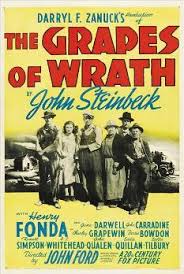
THE GRAPES OF WRATH
US, 1940, 128 minutes, Black and White.
Henry Fonda, Jane Darwell, John Carradine, Charley Grapewin. Directed by John Ford.
The Grapes of wrath is one of the finer adaptations of a John Steinbeck novel. Made by John Ford and acclaimed in 1960, it was a visual presentation of contemporary American history. It is important to realise that it portrays the period in which it was made. It seems very much like American history now. Beautifully photographed in black and white, the film shows the hardship of the dust-bowls of central America as well as the hardships of the families trying to migrate to California with their dreams.
Henry Fonda is at his best in the central role. Jane Darwell, who was impressive in such films as The Oxbow Incident, won the Oscar as Best Supporting Actress for her performance. Ford made many fine films at the time, e.g. The Long Voyage Home and How Green Was My Valley. Other adaptations of Steinbeck novels have included Kazan's East of Eden, the various versions of The Red Pony, Tortilla Flat and so on. An interesting comparison of film-making about this era is the biography of Woody Guthrie, Bound for Glory, by Hal Ashby (1976). The Grapes of Wrath is considered a film classic.
1. The value of this film, its status over the decades, its awards, social criticism, place in John Ford's work?
2. The reputation of John Steinbeck, his literature, his status, his awareness of social issues, reflection of America in the 30s? The impact of Steinbeck, Ford, and the film in the early 40s, after the Depression, the beginning of World War II? Impact now?
3. How valuable a piece of Americana is the film? As embodying the 30s, attitudes of the early 40s, now, comparisons?
4. The impact and quality of the black and white photography and the music? The importance of light and shadow, close-ups, locations, studio work? A feel for the times?
5. Audience involvement in the structure of the film: identification with Tom Joad and participating in his journey and quest, the never-ending quest?
6. Henry Fonda's portrayal of Tom - it is considered the archetypal American performance. Does the film justify this? His presence, presentation of himself, coming out of jail, our journeying into Oklahoma with him? The explanation of his background, the conversation with the lorry driver and Tom's attitudes? His strengths of character, the ordinary American type, the situation for which he went to jail? His attitudes towards the death?
7. The importance of the initial encounter with Casey? The value of Casey's story, Tom's remembering when he was a preacher, the sermons? Casey as feeling lost, the spirit gone from him? Trying to get a meaning in his life, travelling one way and another? A man lost in orientation in the 30s? The importance of his going on with Tom, their experiences together, to death?
8. Euly: his sudden appearance in the deserted house, the importance of the flashbacks shown during his conversation, the close-up of Euly's face and sense of desperation and almost madness, his appreciation and evaluation of what had happened? The brief story of the company's taking over, evicting the families from their land, bulldozing the homes and the ruthlessness of this? The comments of the driver who said that he had to earn his living? The superintendents and their supervision and harsh application of the law? Audience feeling and sense of injustice?
9. The portrayal of hardship, the question of who was to blame, the businessmen in their cars acting as agents, the cruelty of the eviction, the destruction of homes? How much of a spirit of anger was there? Themes of justice, the mystery in the minds of the people who were experiencing this?
10. The Joad family presented within this atmosphere, their sitting at the meal, the introduction of the various characters of Grandpa and Grandma, Pa and Ma, Rose of Sharon, Uncle John? How well did the screenplay and the director introduce each character and characterise them? Tom and his return home and the atmosphere of feeling, welcome?
11. The impact of the journey and the travel through Oklahoma, the collage of the various places through which they moved, the home that they were leaving? The terrain, the sense of a huge journey, the endurance and the suffering, the amount of money they had, food? The importance of the sequence in the cafe? The people that they met, the police?
12. The pathos of Grandpa's death? The symbolism of this, of moving away from how and dying? Grandma's reaction? The human sentiment portrayed and audience response to this within the plight of the Joads?
13. Hints of trouble with the arrival in the rest camp, the explanation of apprehension, the testing of courage and endurance to go on? The Arizona boundaries?
14. The impact of their arriving at California, pushing the truck up the hill, a symbol of their final effort, the sudden vision of the peacefulness and the valleys of California? The difficulties of getting through the border, ma and her shrewdness in appealing to Grandma's illness? The irony that Grandma was dead? Comment on the kindly people that they met helping the people from Oklahoma move through: the inspectors and their allowing the truck to go without being examined, the waitress at the cafe and her initial hostility, the bread, the sweets, her boss, the lorry driver's paying for it? The comment of the garage attendants and their belief about the low quality of the way of life of the people from Oklahoma?
15. The presentation of the transit camps, the exploiting of the men, the agents without authorization, the deals, the fights, the agitators and the violence ensuing, the hungry children watching ma prepare the meal for the family and their starvation? Agitation and shooting? Casey pretending to be the villain as Tom escaped? His going off to prison?
16. Casey with his glint of madness going off with the police, Tom finding him with the strikers, his expressing the cause of justice, opening Torn's eyes, the pathos of his death? The irony of Tom's being to blame and being marked with the bruises and cuts on his face?
17. The pathos of wandering the countryside, searching for work, the man who advised them and said that Spencer sent them? The arrival in the camp, the people lined up, the people allowed to go in, the harshness, the food and some kind of hope, the buckets and the low rates for the fruit, the supervisors and their brutality, Tom not allowed to go for a walk? The discussion about cents and other workers coming in? The fights? The decision for the family to get out and the tension as they moved, concealing Tom?
18. The audience sharing the surprise of the family as they arrived at the government camp? The friendship, the camp superintendent, Ma being treated with dignity? The possibility of some work? The water, the facilities, the children seeing the shower? The hostility of the locals and the agitators? The set-up for the riot and the shrewdness of the group in being able to overcome it? The possibility of happiness?
19. The irony of Tom continuing to be pursued? His having to go? The dramatic significance of his final speech to Ma? its content, the American hope, dream, rights? His going off into the unknown future?
20. The possibility of the family settling down? Ma and Pa and what they had been through, the change of home, the loss of spirit, Pa losing heart, Uncle John, Eddie? Rose of Sharon and the baby and her having been abandoned? The children (How strongly were they delineated at each stage of the journey and the audience identifying with all of these characters?)
21. A strong American document about its social history and social justice?
Published in Movie Reviews
Published in
Movie Reviews
Tagged under
Saturday, 18 September 2021 19:33
Guest Wife
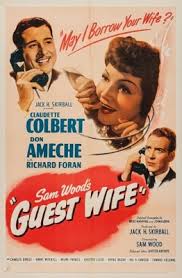
GUEST WIFE
US, 1945, 84 minutes, Black and white.
Claudette Colbert, Don Ameche, Richard Foran, Charles Dingle, Grant Mitchell.
Directed by Sam Wood.
Guest Wife is a 1945 screwball comedy - but not presented with the light touch. The contrived premise is that two men are great friends, one always preventing his more serious friend from enjoying an ordinary life. He turns up, from China, says that his boss wants to meet his wife - but he had invented her, writing letters for her. The friend allows his wife then to substitute. All kinds of identity complications and emotional complications arise. At first, the journalist exploits the situation, then the tables are turned and the wife gets her revenge on the friend.
It is the material that will be done very lightly in a French farce. However, Sam Wood is a much more serious director and does not move the film along with the pace it needs. Claudette Colbert as the wife seems to be enjoying herself and enters into the spirit of the thing. Don Ameche looks somewhat awkward as the journalist. Richard Foran defies belief as the accommodating friend (and in later days, commentators on sexual politics would be looking for subtexts in their relationship).
1. The popularity of this kind of film in the US at the end of World War II? How well does it stand up?
2. The plausibility of the plot, the happy marriage of the Prices, the friendship with Joe Parker, his exploits, turning up, the demands at the railway station, the bank problems, scandals, the passing off of Mary as his wife, the shenanigans in the hotel, the hotel detective, the shoemaker?
3. Black and white photography, Ohio, New York City? The jaunty musical score?
4. The character of Mary, in love with her husband, the comfortable-living wife, wanting a second honeymoon, dreading the telegram, dreading Joe's arrival, her reaction to him, the situation, her stranded on the train with him, going along with it despite resistance, with the boss, her pretences, listening to the letter from India, worn out, the phone call from Chris? Her continuing the plot, her deciding to turn the tables, accepting the visit to the country, her reaction to Joe, his bewilderment, meeting Susie and explaining things to her? At the house, her pretence, the night, his sitting in the rain? Chris and his being upset? The happy reconciliation - and the crashing into the signpost advertising Joe's work?
5. Joe, the man-about-town, the man-about-the-world, the friendship with Chris, the memories of the football game, his making demands, arriving, the situation, carrying it off, listening to the letter, doing the speeches, the night, his being a gentleman in the pyjamas, the next morning, his outing with Susie? Susie and her telling him that Mary was in love with him? The boss, going to the coast? The mix-ups at the table, Chris's arrival, the night, in the rain? His being assigned after he explained to the boss that the marriage was collapsing?
6. Chris, the devoted husband beyond belief, always eager, talking about Joe, staying behind, the scandal at the bank, arrival in New York, the clashes with the house detective? Turning up on the coast, the mix-ups, the antagonism of the boss? The happy ending?
7. The boss, his putting Joe on a pedestal, the story, the clashes with Chris, at his home?
8. The house detective and the complications, the man who sold shoes and his causing upsets in the nightclubs, the man at the bar and his double-takes about the relationships between the three?
9. The American screwball comedy, the light touch, the heavy touch?
Published in Movie Reviews
Published in
Movie Reviews
Tagged under